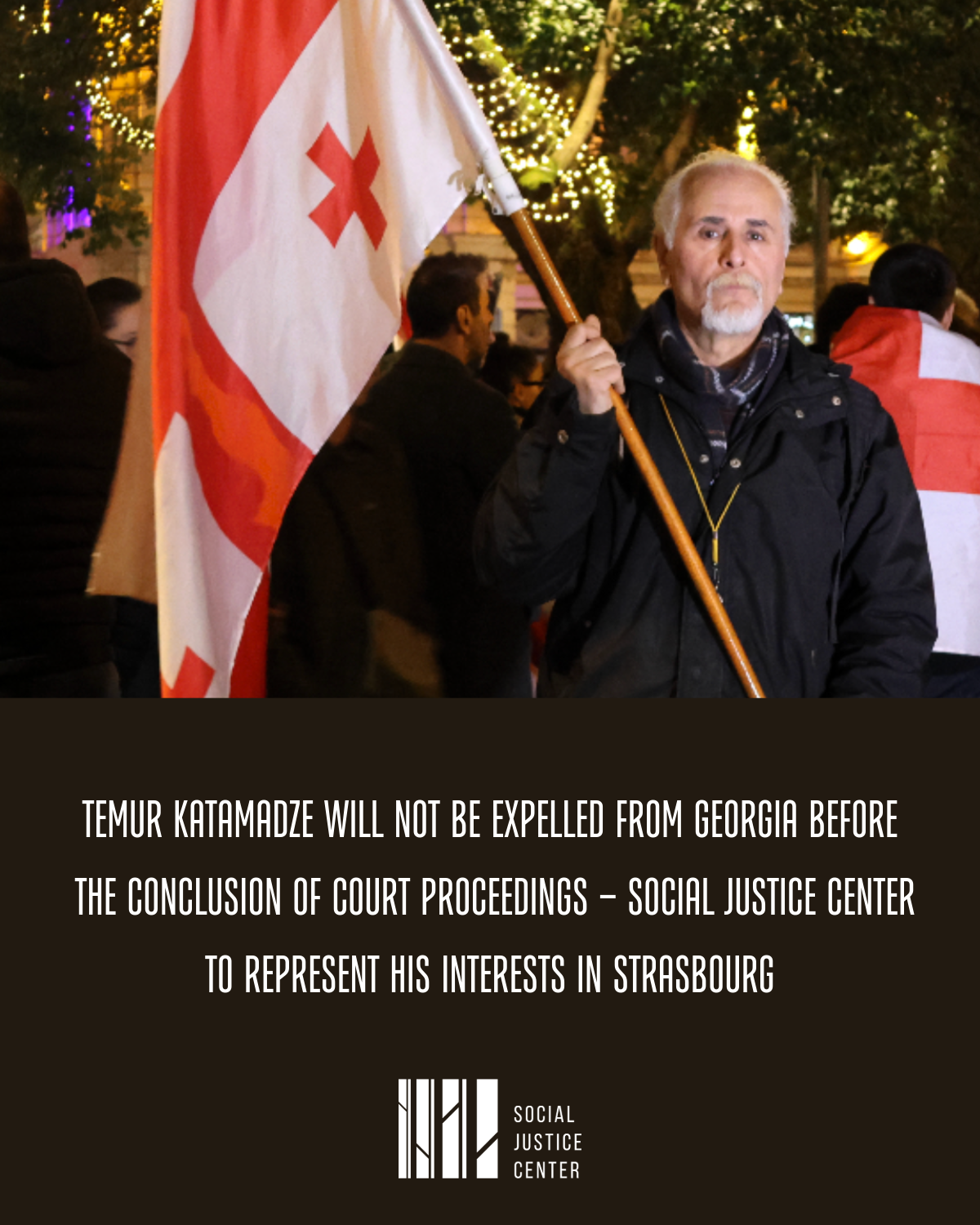საერთო ცხელი ხაზი +995 577 07 05 63


Given the significant public interest in the case of Temur Katamadze - the Batumi protest flagbearer, we would like to provide an update on the current status of the proceedings.
As publicly known, on April 30, 2025, the Migration Department of the Ministry of Internal Affairs issued a decision to expel Temur Katamadze, granting him a 10-day period to voluntarily leave the country. However, according to an official verbal communication from the Migration Department, this 10-day period has not yet commenced. It will only begin once the court renders a final decision on the expulsion order issued by the department. The same interpretation regarding the start of the time period and the upcoming procedures has been communicated by the Ministry’s Migration Department to the Public Defender’s Office.
Upon the conclusion of domestic judicial proceedings and the commencement of expulsion procedures, Social Justice Center plans to submit a request to the European Court of Human Rights (ECtHR) for the application of interim measures, with the aim of preventing possible violations of Katamadze’s rights in the event of forced removal to Turkey.
Key Facts of the Case
As is already publicly known, expulsion proceedings against Temur Katamadze were initiated by the Migration Department on January 16, 2025, following his unlawful administrative detention during the Batumi protests, in which he was actively involved. Katamadze served as a prominent figure and flagbearer in these continuing demonstrations.
Temur Katamadze is a descendant of muhajirs. He is an active member, leader, and activist of "Chveneburebi," an organization founded by ethnic Georgians residing in Turkey. He arrived in Georgia in 2012 and has not left the country since, aiming for full reintegration and permanent residence in Georgia. Until 2019, Katamadze lived in Georgia on a work visa. In 2020, however, he was denied an extension. Over the years, he applied for Georgian citizenship three times (in 2012, 2015, and 2019), but each application was rejected. He continues to challenge the refusal of citizenship in court, with proceedings ongoing at the Tbilisi City Court since 2019.
The issue of his expulsion was raised only after Katamadze’s participation in the Batumi protests, during which he was arbitrarily detained by local police and sentenced to five days in detention. Immediately upon release, he was re-arrested in front of the temporary detention facility—this time for alleged violations of immigration regulations.
Following his arrest, Temur Katamadze applied to the Migration Department for asylum. His request was denied within three days. He maintains that, on January 8, 2023, he received an email from the Turkish Embassy in Tbilisi informing him that a warrant for his arrest had been issued in Turkey. However, despite multiple attempts, he has not been informed by Turkish authorities about the legal basis or reasons for this warrant. Due to the expiration of his passport, Turkey refused to issue the necessary authorization documents, effectively stripping him of legal subjectivity and preventing him from defending his rights. Katamadze believes the investigation against him in Turkey may be related to his activism. He also suspects that it could be connected to his personal relationships in Georgia with individuals associated with the Fethullah Gülen movement - though this remains an unsubstantiated assumption. The Migration Department did not properly assess the circumstances of his potential persecution in Turkey, particularly given that Katamadze was deprived of legal access to information about the grounds for his arrest and was thus unable to effectively defend himself.
Unfortunately, the decisions of the Migration Department were upheld by both the Tbilisi City and Appellate Courts, which issued expedited judgments within four months. At the national level, Katamadze is represented by the Georgian Young Lawyers’ Association (GYLA), our partner and ally organization.
It is worth noting that, during the asylum litigation process, Social Justice Center submitted an amicus curiae brief to the Tbilisi City Court. This brief reviewed Katamadze’s individual circumstances, the human rights situation in Turkey, and the risks of torture, inhuman treatment, unfair trial, and arbitrary and discriminatory persecution he might face upon removal. The brief included up-to-date assessments and reports from international human rights organizations on Turkey’s human rights record. However, the court did not adequately consider our submission.
On April 29, 2025, the Tbilisi Court of Appeals upheld the lower court’s decision, thus exhausting the national legal avenues for appealing the denial of asylum. The very next day, on April 30, the Migration Department resumed the suspended expulsion procedure and set a 10-day deadline for Katamadze’s voluntary departure.
Temur Katamadze, with the assistance of GYLA, has filed a complaint against the expulsion order at the Tbilisi City Court. Nevertheless, he feared that this appeal alone would not prevent his removal. The written communication from the Migration Department explicitly outlines the timelines and regime for both voluntary and forced expulsion. However, relevant international legal norms do not provide direct guidance on how these timelines should be interpreted, which created legal uncertainty regarding the application of domestic law.
On May 8, 2025, during an official meeting, Social Justice Center requested clarification from the Migration Department. Its representatives verbally confirmed that, since Katamadze filed his complaint within the legal timeframe, under the Administrative Procedure Code and the General Administrative Code of Georgia, the enforcement of the expulsion order is suspended until the court’s decision enters into legal force. As noted above, this interpretation was also shared with the Public Defender’s Office.
At present, Temur Katamadze remains in the Migration Department’s Temporary Placement Center, awaiting the court’s decision. Social Justice Center is preparing to represent Gaffar Elmazi’s (Temur Katamadze) interests before the European Court of Human Rights, including by requesting interim measures under Rule 39 of the European Convention on Human Rights.
Social Justice Center will continue to keep the public informed about developments in the case and the upcoming procedural steps.
The website accessibility instruction